Asok Kumar Das and Chittaranjan Dasgupta Solutions for Chapter: Current Electricity, Exercise 1: EXERCISE 5
Asok Kumar Das Physics Solutions for Exercise - Asok Kumar Das and Chittaranjan Dasgupta Solutions for Chapter: Current Electricity, Exercise 1: EXERCISE 5
Attempt the practice questions on Chapter 5: Current Electricity, Exercise 1: EXERCISE 5 with hints and solutions to strengthen your understanding. A Text Book of PHYSICS PART 2 : CLASS 12 solutions are prepared by Experienced Embibe Experts.
Questions from Asok Kumar Das and Chittaranjan Dasgupta Solutions for Chapter: Current Electricity, Exercise 1: EXERCISE 5 with Hints & Solutions
The given graph shows the variation of resistance of mercury in the temperature range Name the phenomenon shown by the graph of figure.
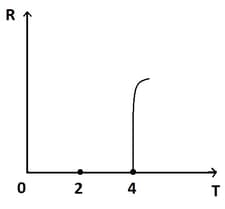
A secondary cell of emf is being charged by an external supply. Its terminal voltage during charging is . Compare and .
The figure, Fig. Shows a potentiometer with a cell of And internal resistance Maintaining a potential.
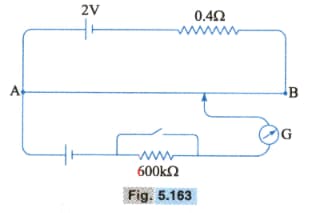
Drop across a resistor wire A standard cell which maintains a constant emf of (for very moderate current currents up to a few ) gives a balance point at Length of the wire. To ensure very low currents drawn from the standard cell, a very high resistance of Is put in series with it, which is shorted close to balance point. The standard cell is then replaced by a cell of unknown emf And the balance point found similarly turns out to be at Length of the wire.
(a) What is the value of ?
The figure, Fig. Shows a potentiometer with a cell of And internal resistance Maintaining a potential
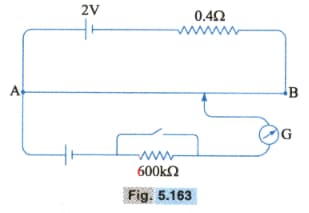
Drop across a resistor wire A standard cell which maintains a constant emf of (for very moderate current currents up to a few ) gives a balance point at Length of the wire. To ensure very low currents drawn from the standard cell, a very high resistance of Is put in series with it, which is shorted close to balance point. The standard cell is then replaced by a cell of unknown emf And the balance point found similarly turns out to be at Length of the wire.
(b) What purpose does the high resistance of .
The figure, Fig. Shows a potentiometer with a cell of And internal resistance Maintaining a potential
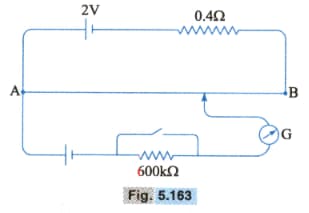
Drop across a resistor wire A standard cell which maintains a constant emf of (for very moderate current currents up to a few ) gives a balance point at Length of the wire. To ensure very low currents drawn from the standard cell, a very high resistance of Is put in series with it, which is shorted close to balance point. The standard cell is then replaced by a cell of unknown emf And the balance point found similarly turns out to be at Length of the wire.
(c) Is the balance point effect by this high resistance?
The figure, Fig. Shows a potentiometer with a cell of And internal resistance Maintaining a potential
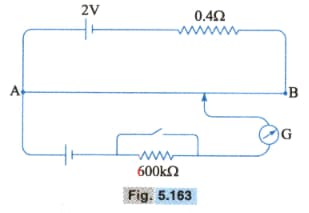
Drop across a resistor wire A standard cell which maintains a constant emf of (for very moderate current currents up to a few ) gives a balance point at Length of the wire. To ensure very low currents drawn from the standard cell, a very high resistance of Is put in series with it, which is shorted close to balance point. The standard cell is then replaced by a cell of unknown emf And the balance point found similarly turns out to be at Length of the wire.
(d) Is the balance point affected by the internal resistance of the driver cell?
The figure, Fig. Shows a potentiometer with a cell of And internal resistance Maintaining a potential
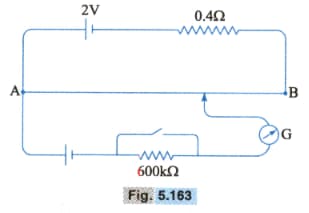
Drop across a resistor wire A standard cell which maintains a constant emf of (for very moderate current currents up to a few ) gives a balance point at Length of the wire. To ensure very low currents drawn from the standard cell, a very high resistance of Is put in series with it, which is shorted close to balance point. The standard cell is then replaced by a cell of unknown emf And the balance point found similarly turns out to be at Length of the wire.
(e) Would the method work in the above solution if the driver cell of potentiometer had an emf of Instead of ?
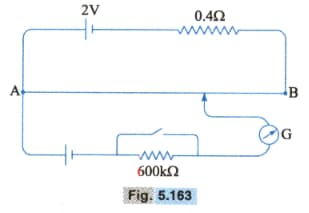
The figure, Figure shows a potentiometer with a cell of and internal resistance maintaining a potential drop across a resistor wire A standard cell which maintains a constant emf of (for very moderate current currents upto a few ) gives a balance point at length of the wire. To ensure very low currents drawn from the standard cell, a very high resistance of is put in series with it, which is shorted close to balance point. The standard cell is then replaced by a cell of unknown emf and the balance point found similarly turns out to be at length of the wire. Would the circuit work well for determining an extremely small emf, say of the order of a few (such as the typical emf of the thermocouple)? If now, how will you modify the circuit.
